September, 1933
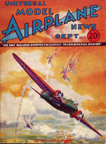
Martin B-10 Bomber
Model Airplane News Cover Art for September, 1933
by Jo Kotula
Click to Enlarge
The Martin B-10 was the first all-metal monoplane bomber to go into regular use by the United States Army Air Corps, entering service in June 1934. It was also the first mass-produced bomber whose performance was superior to that of the Army's pursuit aircraft of the time. The B-10 included several revolutionary features and won the Collier Trophy in 1932.
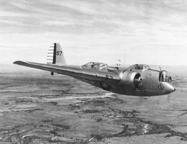
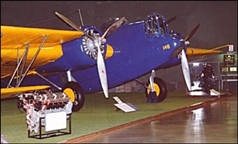
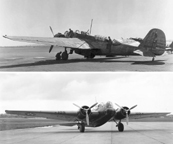
Martin B-10 Bomber
Click to Enlarge
The XB-10 began as the Martin Model 123, a private venture by the Glenn L. Martin Company of Baltimore, Maryland. It had a crew of four: pilot, copilot, nose gunner and fuselage gunner. As in previous bombers, the four crew compartments were open. It had the first known example of a powered gun turret in a military aircraft, located in the nose position. It had an internal bomb bay and retractable main landing gear. Its 600 hp engines allowed for significant power. It first flew in February 1932. When the XB-10 flew during trials in June, it recorded a speed of 197 mph at 6,000 ft, an impressive performance for 1932. Following the success of the XB-10, a number of changes were made, including reduction to a three-man crew, addition of canopies for all crew positions, and an upgrade to 675 hp engines. The Army ordered 48 of these.
In 1935 the Army ordered an additional 103 aircraft designated B-10B. B-10Bs served with the 2nd Bomb Group at Langley Field, the 9th Bomb Group at Mitchell Field, the 19th Bomb Group at March Field, the 6th Composite Group in the Panama Canal Zone, and the 4th Composite Group in the Philippines. In addition to conventional duties, some B-10s operated for a time on large twin floats for coastal patrol. The Army owned the rights to the Model 139 design. Once the Army's orders had been filled in 1936, Martin received permission to export them, and delivered versions to several air forces. For example in 1937, six were sold to Siam and 20 were sold to Turkey in September
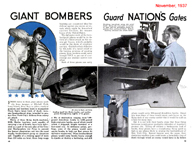
Martin B-10 Bomber
in Popular Mechanics November, 1937
Click here to download a ".pdf" of "Giant Bombers Guard the Nation's Gates" Click to Enlarge
At the time of its creation, the B-10B was so advanced that General Henry H. Arnold described it as the air power wonder of its day. It was 1.5 times as fast as any biplane bomber, and faster than any contemporary fighter. The B-10 began a revolution in bomber design; it made all existing bombers completely obsolete. However, the rapid advances in bomber design in the 1930s meant that the B-10 was eclipsed by the B-17 "Flying Fortress" and B-18 "Bolo" before the United States entered World War II. The B-10's obsolescence was proved by the quick defeat of B-10B squadrons by Japanese Zeros during the invasions of the Dutch East Indies and China.
Here is a video showing both Martin B-10 Bomber and the Boeoing YB-9 Bomber:
Click Here for more information about the Martin B-10 Bomber.
The Martin B-10 was quite advanced for its time and generated a lot of interest, especially among Boys who fancied its futuristic lines. The plane was accepted in late 1933 and by 1934 Cleveland offered a kit for the airplane, even before the B-10 designation had been granted.


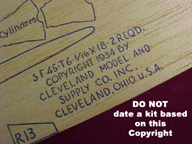
Cleveland Model of the Martin B-10 Bomber
Click to Enlarge
You can buy the plans and patterns that will enable you to make this model right now. Click Here to go to the exact location on the Cleveland Website to get them.
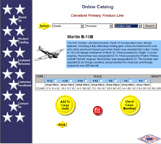
The Martin B-10 Bomber at the Cleveland Site
Click to Enlarge
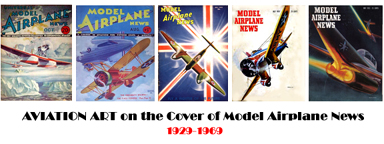
Click to go back and select another cover.
Counter for the Entire Site (not just this page..)
Home | About Lindy | Last Week's Reviews | Upcoming Events | 1940s Collecibles
The Guide - Establishments - Travel - Accessories
Music | Links | Photo Gallery | Extras | Contact